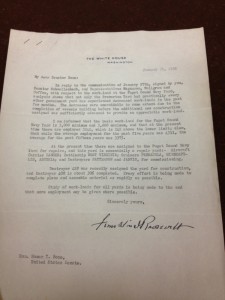 When most people discover that I work in an archive, the first question that always comes up is, “what exactly do you do in the archives?” That question is one that I’ve always had a difficult time answering precisely because there are so many different things that we do in the University of Puget Sound Archives. The Archives & Special Collections, located on the second floor of the library (room 211, come visit us sometime!), are truly a hidden treasure on this campus. We store archival material, mostly from different Puget Sound departments and programs, but we are also fortunate to have a wide array of personal and family papers as well.
When most people discover that I work in an archive, the first question that always comes up is, “what exactly do you do in the archives?” That question is one that I’ve always had a difficult time answering precisely because there are so many different things that we do in the University of Puget Sound Archives. The Archives & Special Collections, located on the second floor of the library (room 211, come visit us sometime!), are truly a hidden treasure on this campus. We store archival material, mostly from different Puget Sound departments and programs, but we are also fortunate to have a wide array of personal and family papers as well.
These private collections range from the Oregon Mission papers (a collection of letters and papers from some of the first missionaries to come west) to the Leroy Ostransky papers (this is a collection of papers and documents from a former Puget Sound music professor and composer). I have been lucky enough to recently have been working with the Homer T. Bone papers.
The Homer T. Bone papers are, by far, one of the biggest collections in the archives, at just over 130 boxes. The size of this collection has always been intimidating, especially when I was asked to work on its inventory. The inventory, which detailed the contents of each box, was immense, and when I first began, I was sure I would never finish! Luckily, I was surprised at how quickly it went, and how interesting this collection turned out to be.
Homer T. Bone, (1883-1970) was a lawyer, politician and judge who was based in Tacoma and the surrounding areas. After switching political parties several times (from Socialist, to Republican, to, finally Democrat) he found immense success as a member of the U.S. Senate for over a decade (1933-1944) during which he was actively involved in a number of committees, while seeming to remain in touch with his constituents back here in Washington.
Of course, with the amount of material in this collection, I could go on and on about Senator Bone, but instead I think I’ll point out a few of the things that I found most interesting, as well as some fun facts I learned. As a senator, Bone was a staunch isolationist, actively working to investigate war profiteering in WWI as part of the Nye Committee. Many of his senate activities were centered on this belief. However, when the time came to declare war on Japan after the Pearl Harbor attacks, neither Bone nor his fellow Washington senator voted, making Washington the only state which did not vote on the declaration of war. This was, however, just a case of being in the wrong place at the wrong time, as Senator Bone was in Florida, recovering from a hip injury, while the other Washington senator was away doing business for a senate sub-committee. Neither could make it back to Washington DC in time for the vote.
As senator, Bone was one of the principle writers of the legislation which established the National Cancer Institute, and worked actively with the Public Works Administration on projects such as the Narrows Bridge and the Bonneville dam. He ended his senate career with a nomination by President Franklin D. Roosevelt to the Ninth Circuit Court of Appeals.
Homer T. Bone was an incredible man with varied interests who was, I believe, an important, if slightly forgotten, part of local and national history. I hope that someday, someone will be inspired, and not intimidated, by this vast and fascinating collection.
By Hannah Ellison
